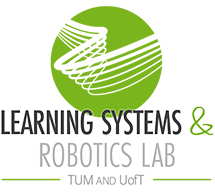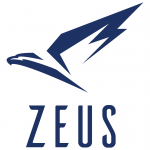To get updates from our aUToronto self-driving car team, please visit this page.
Dynamic Systems Lab News
Interested in doing a PhD with us?
We are offering exciting PhD positions in #robotics and #machinelearning through multiple PhD programs:
- Munich Center for Machine Learning (MCML): mcml.ai/opportunities/funding/phd2025/ (apply between Oct. 15 and Nov. 14)
- relAI Konrad Zuse School of Excellence: zuseschoolrelai.de/application/ (applications open Dec. 2024 / Jan. 2025)
- Three positions directly at our lab: www.ce.cit.tum.de/lsy/open-positions/open-phd-positions/ (apply until Nov. 15)
Angela Schoellig
... See MoreSee Less
- Likes: 1
- Shares: 0
- Comments: 0
Are you a TUM student with a passion for machine learning and robotics? Don’t miss out on our upcoming courses this semester, where you will dive deep into machine learning, computer vision, control systems, and their applications in robotics. Check out the full course offerings here: www.ce.cit.tum.de/lsy/teaching/ #robotics #machinelearning #AI #controlsystems #computervision ... See MoreSee Less
Angela Schoellig, along with Jürgen Schmidhuber, Ioana Ciucă, Ryan McClelland, and Katja Hofmann, will be giving keynotes on the future of AI and robotics in space at ESA's #SPAICE2024! Drop by if you are attending the conference! Website: spaice.esa.int ... See MoreSee Less
We are happy to announce our upcoming workshop “Mastering Robot Manipulation in a World of Abundant Data” to be held at the CoRL2024 in Munich! Visit our website to check out the exciting lineup of speakers and see how you can contribute: www.learnsyslab.org/mastering-robot-manipulation-in-a-world-of-abundant-data/ Submission deadline: October 15, 2024 (11:59 pm AoE) ... See MoreSee Less
What is the impact of releasing code with publications? Dive into our analysis to see how the open-source code landscape has been changing and stimulating scientific progress in machine learning, robotics, and control.
Paper: ieeexplore.ieee.org/document/10621946
... See MoreSee Less
Work in progress!
Angela Schoellig
... See MoreSee Less
We are just two days away from our RSS’24 Workshop on Semantics for Robotics! Check out our lineup of speakers and join us on Monday, July 15 @ 8:45 CEST: tiny.cc/rss24-sfr-workshop
🏠 Location: Lecture Hall D, Aula Conference Centre, TU Delft
🌐 Livestream: tiny.cc/rss24-sfr-youtube
🗓 Workshop Program:
* 09:00 – 09:20: Invited Talk - Oier Mees, “Low-Level Embodied Intelligence with Foundation Models”
* 09:20 – 09:40: Invited Talk - Angela Dai, “From Quantity to Quality for 3D Perception”
* 09:40 – 10:00: Invited Talk - Masha Itkina, “Towards Uncertainty-Aware Embodied Behavior Generalization”
* 10:00 – 10:30: Coffee Break and Poster Session
* 10:30 – 10:50: Invited Talk - Manuel Keppler, “Bridging the Divide: Unified Control for Rigid and Elastic Robots”
* 10:50 – 11:10: Invited Talk - Federico Tombari, “Open-set Semantics for Environment Understanding”
* 11:10 – 11:30: Invited Talk - Michae Milford, “What Can Understanding do for Navigating and Localizing Robots?”
* 11:30 – 12:30: Morning Session Panel Discussion
* 14:00 – 14:30: Spotlight Talks
* 14:30 – 14:50: Invited Talk - Luca Carlone, “Metric-Semantic World Models”
* 14:50 – 15:10: Invited Talk - Marco Pavone, “Leveraging Foundation Models to Develop Safer AV Stacks”
* 15:10 – 15:30: Invited Talk - Koushil Sreenath, “Generative Self-Supervised Learning for Legged Locomotion”
* 15:30 – 16:00: Coffee Break and Poster Session
* 16:00 – 16:20: Invited Talk - Andrea Bajcsy, “Towards Human–AI Safety: Unifying Generative AI and Control Systems Safety”
* 16:20 – 16:55: Afternoon Session Panel Discussion
* 16:55 – 17:00: Concluding Remarks
🔖 Organizers: Angela Schoellig, SiQi Zhou, Lukas Brunke, Federico Pizarro Bejarano, Adam Hall, Jingxing (Joe) Qian, and Sepehr Samavi
... See MoreSee Less
We are excited to announce our “RSS 2024 Workshop on Semantics for Robotics” to be held at the TU Delft on July 15! Visit our workshop webpage at tiny.cc/rss24-sfr-workshop to see the program and submit your questions for our panel discussions. The workshop will be held in a hybrid format - join the discussion and help shape the future of robotics! ... See MoreSee Less
Want to work at the cutting edge of robotics/AI and have excellent admin skills? We are excited to announce a new administrative position opening in our team at TUM.
To join our young and dynamic team, apply here:
portal.mytum.de/jobs/sonstige/NewsArticle_20240618_120130
Deadline: 17.07.2024.
Angela Schoellig
... See MoreSee Less
" In our recent RAL paper, to be presented at ICRA 2024, we propose a method to combine data from range and visual-inertial sensors to perform accurate closed-loop navigation in cluttered indoor environments.
More info (code & data) in our paper: arxiv.org/abs/2311.09056
Video: www.youtube.com/watch?v=uJMKfebp5-g
Angela Schoellig
... See MoreSee Less



